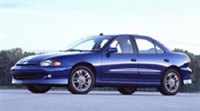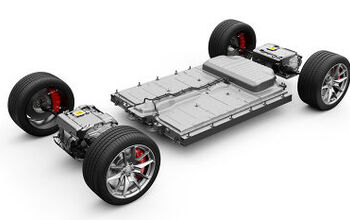General Motors Death Watch 6: Petard Hoisting
Mr. Witzenburg's recent TTAC editorial criticized Mr. Farago for his anti-GM bias and asked us to give the domestic automaker a fair shake. While I respect Mr. Witzenburg's loyalty and patriotism, he seems to have overlooked the fact that his former employer makes some truly awful automobiles. As the cornerstone of his defence, the automotive journalist asked readers to name one– just one– poorly-made car from the General Motors line-up. Alright then, what about the Chevrolet Cavalier?
My best friend, sister and mother all had the displeasure of owning a Cavalier ('94, '00, '04). During their stewardship, pieces fell off, the electronics failed (headlights, windows, and stereo) and there were several major mechanical failures (transmission starter, alternator and master brake cylinder). Witzenburg may dismiss these complaints as relating to an "old" design, but their saga is not peculiar to the Cavalier. Perhaps owners of other GM products would like to email their tales of woe to Mr. Witzenburg. Anyway, a car company is only as good/bad as their weakest model.
I also reject Witzenburg's argument that build quality is everything; he claims you can't criticize a GM product simply because you don't like it. Sorry? Why not? Despite Mr. Witzenberg's affections for JD Power, 'objective' quality surveys are not the ultimate measure of an automaker's products. It's whether or not people like their vehicles enough to buy them. Is Witzenburg saying that people are "wrong" because they don't like a GM car's looks, handling, performance or cost of ownership? GM may still sell a Hell of a lot of cars, but their declining market share says it's GM– not its customers– that's been getting it badly wrong, for a long, long time. To suggest otherwise is blaming the victim.
There's another way to gauge the public's general regard for GM's products: depreciation. If GM was making great cars, they'd all hold their value like a Honda Accord. They don't. For example, within one year, the aforementioned Cavaliers shed nearly 45% of their original value. In fact, the pro-GM writer should click-on-over to kbb.com and have a look at the used car values right across the GM range. There's no better place to get a feel for how little the public thinks about GM's engineering and design.
But let's get back to new product. Continuing our quest for lousy cars, how about Saturn? They may last a long time, but is that a good thing? Most of these cars use plastic far cheaper than Mattel dinky-cars. They have underpowered engines, terrible interiors, weak suspensions, junk brakes and dismally uninspired interiors. And they're ugly. The media reports that GM will rectify all of these problems with a new batch of high-quality product. Now where have I heard THAT before?
While many cars in GM's line-up aren't lousy in and of themselves, they're clearly not "up" to the competition. The top-spec Saab 9-5 is a nice car, but so is a fully-loaded Nissan Altima, for $10k less. Or, for the same price as the Saab, how about a BMW 525? The Bimmer's retained value would even pay for a few extra toys. Buick's latest and greatest, the Lacrosse, or a Nissan Maxima? Guess which is cheaper, better styled in and out, has more power, better gearing, and still gets better fuel economy. Bottom line, in every situation, there's at least two or three compelling reasons to buy from GM's competition.
Witzenburg and his supporters like to point to the one supposed bright spot in GM's constellation: Cadillac. Although the CTS is a great car that builds on the Escalade's success/excess, Cadillac is hardly out of the woods. The XLR and STS are both perilously close to being flops: over-priced and under-deluxed. Again, check the sales charts; Caddy have yet to prove that they have what it takes to take-on Lexus, BMW, Mercedes, etc. and win. And again, cliff-face depreciation tells the tale of a division with more pretensions than product.
It's time for GM and its supporters to wake up. The only people giving them high numbers on surveys are those that don't know anything about cars, or what a decent car actually feels like to drive. When they do try a GM competitor's product, they usually don't come back. You can shout that GM makes great cars until you're blue in the face, but the there's no getting around the fact that people aren't buying them– any of them– like they used to. There's a lot of good reasons for that, and it isn't media propaganda. Until and unless GM builds great cars, like it or not, it's going to get exactly what it deserves.
More by Jon Arnett
Latest Car Reviews
Read moreLatest Product Reviews
Read moreRecent Comments
- Kjhkjlhkjhkljh kljhjkhjklhkjh A prelude is a bad idea. There is already Acura with all the weird sport trims. This will not make back it's R&D money.
- Analoggrotto I don't see a red car here, how blazing stupid are you people?
- Redapple2 Love the wheels
- Redapple2 Good luck to them. They used to make great cars. 510. 240Z, Sentra SE-R. Maxima. Frontier.
- Joe65688619 Under Ghosn they went through the same short-term bottom-line thinking that GM did in the 80s/90s, and they have not recovered say, to their heyday in the 50s and 60s in terms of market share and innovation. Poor design decisions (a CVT in their front-wheel drive "4-Door Sports Car", model overlap in a poorly performing segment (they never needed the Altima AND the Maxima...what they needed was one vehicle with different drivetrain, including hybrid, to compete with the Accord/Camry, and decontenting their vehicles: My 2012 QX56 (I know, not a Nissan, but the same holds for the Armada) had power rear windows in the cargo area that could vent, a glass hatch on the back door that could be opened separate from the whole liftgate (in such a tall vehicle, kinda essential if you have it in a garage and want to load the trunk without having to open the garage door to make room for the lift gate), a nice driver's side folding armrest, and a few other quality-of-life details absent from my 2018 QX80. In a competitive market this attention to detai is can be the differentiator that sell cars. Now they are caught in the middle of the market, competing more with Hyundai and Kia and selling discounted vehicles near the same price points, but losing money on them. They invested also invested a lot in niche platforms. The Leaf was one of the first full EVs, but never really evolved. They misjudged the market - luxury EVs are selling, small budget models not so much. Variable compression engines offering little in terms of real-world power or tech, let a lot of complexity that is leading to higher failure rates. Aside from the Z and GT-R (low volume models), not much forced induction (whether your a fan or not, look at what Honda did with the CR-V and Acura RDX - same chassis, slap a turbo on it, make it nicer inside, and now you can sell it as a semi-premium brand with higher markup). That said, I do believe they retain the technical and engineering capability to do far better. About time management realized they need to make smarter investments and understand their markets better.


































Comments
Join the conversation